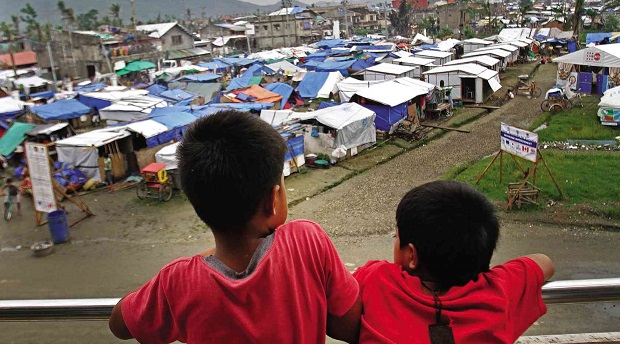Community-driven recovery plan eyed for ‘Yolanda’-hit areas
MANILA, Philippines — Starting the recovery from the ground up is how “some of the best minds possible” want to work on areas devastated by Super Typhoon “Yolanda” (international name: Haiyan).
Nearly four months after the monster typhoon took a sizeable bite and spat out a nearly unrecognizable Eastern Visayas, these top minds converged at the second annual Pacific Cities Sustainability Initiative Tuesday and expressed a common belief that recovering from “Yolanda’s” maelstrom should start from the communities themselves, with a bit of political will.
“Whatever we do, we try to get the best minds possible to address these issues,” said Tom Nagorski, Executive Vice President of Asia Society, an educational organization promoting understanding among nations.
A calamity victim himself, former Christchurch mayor Sir Robert Parker said that his city, which was nearly leveled in two earthquakes in 2010 (magnitude 7.1) and 2011 (magnitude 6.3), bounced back from calamities in less than six months and attributed the success to its people.
He added that recovering from such a gigantic disaster was not “rocket science” and that the citizens merely relied on their political will to return to normalcy.
“I don’t think that the lessons (learned after recovering from the disaster) are rocket science,” Parker said. “It’s pretty basic, all we needed to make it happen was political will.”
Parker said that in terms of the damage in the Philippines, similar measures could be taken up which would be a larger scale of their recovery actions in Christchurch.
“When we recovered, the lesson is what happens in the future,” Parker said. “We needed sustainability, people to go to work which in turn would keep the economy running.”
He shared that within 48 hours, they changed the local laws which sped up the bureaucracy and helped people set up businesses within their homes.
After the first 48 hours, Parker said that his city put a lot of energy in the sustainability efforts for the next two to three years and used international aid as support.
The long-term plan
Kathleen Carey, Executive Vice President and Chief Content Officer of Urban Land Institute (ULI), added that recovering after a disaster did not mean getting back up immediately.
She said that communities should have the mindset to think for the long term and visualize what they could do to improve from their previous situations.
“Cities should become more resilient,” Carey said, pertaining to climate change issues and “Yolanda.” “They should not only recover, but they should also think for the long-term goals.”
Carey said that even if Hurricane “Sandy” and “Yolanda” took turns ravaging countries which were oceans apart, most questions tend to be the same.
She added that the communities and the government themselves should make difficult decisions.
Also present in the event were Bruce Pickering, Asia Society Vice President of Global Programs, Carlos Rufino, Chair of ULI Philippines, John Fitzgerald, Chief Executive of ULI Asia Pacific, Gloria Steele, Mission Director of USAid Philippines, and Guillermo Luz, Private Sector Co-Chairman of the National Competitiveness Council.
RELATED STORIES
Glimpses of devastation a day after ‘Yolanda’
Over 4M people affected by ‘Yolanda’ — DSWD
Lessons from the Christchurch quake
